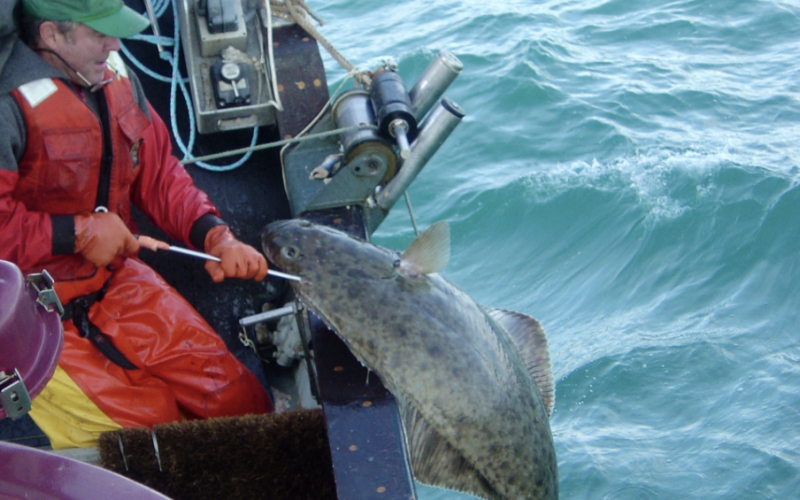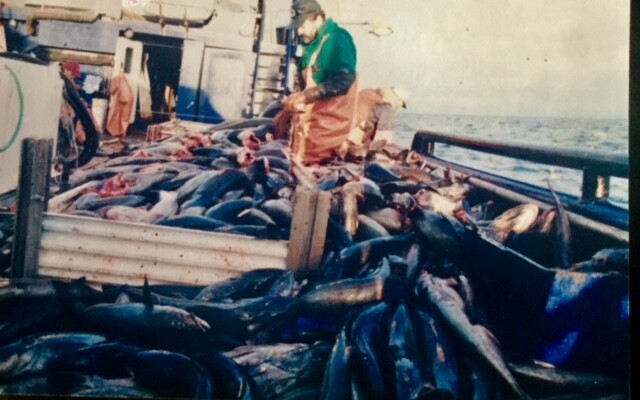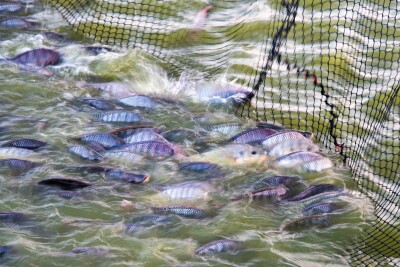After a long life at sea, a debilitating car accident and a subsequent stint in a powered wheelchair, Alaska fisheries pioneer Pat McBride has pointed his bow for horizons beyond Earth. He died of heart failure on Dec. 1 at the age of 69.
McBride entered the Alaska fisheries in the late 1970s and fished waters where, but he first came to Homer from Virginia, when he was just 11 years old.
Even in his adolescence Alaska and the lure of its saltwater had claimed him for a life that started with building a lodge with his brother in China Poot Bay, near Homer. He returned and then began work on what would eventually become a lodge of his own. In the meantime, he met and married Barb, the love of his life and business partner. They were married in 1978.
Not long after that, the young couple entered the fisheries for halibut and blackcod. One of his first ventures involved the purchase of the wooden vessel Invader with a partner. In a later endeavor, he and Barb staked their all on loans to buy the Judi B, a 100-foot freezer longliner that he ran to the extreme end of the Aleutian Islands to fish halibut and blackcod.
“We were doing 40-day trips. We were a freezer boat,” he said during numerous talks to crowds who had come to hear his sea stories – and his stories about life as a quadriplegic.
“We went to the end of the Aleutians where hardly anybody had been before. We ran all the way to Kiska. It was a three-day run (from where he delivered fish at Dutch Harbor) before you could even start fishing.”

Though Barb made numerous trips with Pat at sea, the majority of her time was spent developing markets, selling and arranging for shipments of their blackcod directly to customers in Japan.
“I was on the boat sometimes,” she says, “But mostly I did the market and put the fish out to bid.”
From Kiska and Attu Islands, to Nome in the Bering Sea, to extreme Southeast Alaska and all points between, McBride’s footprint in the fishing world comprised an appreciable expanse of the globe. Some years he spent 280 days at sea and ran a 10-man crew. After longlining for 35 years, the McBrides decided to slow down a bit. They sold the Judi B, bought the Bear, a smaller boat that they intended to fish closer to their homeport of Homer and spend more time visiting relatives on the East Coast.
It was on one of those trips to visit Pat’s sister that they slid off the road. The car rolled down a steep embankment, and Pat suffered a broken neck. The injury paralyzed him from the head down.
McBride said in his recordings and video talks that for more than three years he avowed that he would walk again. After therapy and experimental treatments in the United States and abroad, however, he came home to Alaska in the realization that he would spend the rest of his life in a wheelchair.
The abrupt change in his mobility motivated him to speak to various groups with disabilities and to advocate for improved wheelchair access to facilities and businesses. To that end, he and Barb retrofitted their lodge, Sea Bright, in China Poot Bay to accommodate guests in need of wheelchair access and listed it with VRBO.







